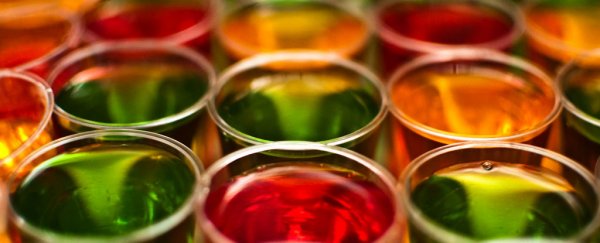Everybody has a different level of tolerance for alcohol, but for some people, even having a small amount to drink can make them act very strangely, exhibiting reckless, impulsive, or sometimes even dangerous behaviour.
Now a new study sheds light on one of the underlying biological causes for this, with a team of Finnish researchers finding that a mutation in some people's serotonin 2B receptor gene can render them prone to impulsive behaviour, especially when they're under the influence of alcohol.
"The results also indicate that persons with this mutation are more impulsive by nature even when sober, and they are more likely to struggle with self-control or mood disorders," said Roope Tikkanen, a psychiatrist at the University of Helsinki.
While scientists don't fully understand how the serotonin 2B receptor functions in humans, the researchers discovered that a link between a mutated version of the receptor (called HTR2B Q20*) and impulsive behaviour is relatively common, identifying it in 2.2 percent of the Finnish population. This means more than 100,000 people in Finland alone are carrying it.
"The impact of one gene on complex phenomena is typically minor," said Tikkanen. "But it is possible to identify the impact of such a genetic mutation in the Finnish population, as our historical isolation has led to a relatively homogenous gene pool."
Aside from the fact that the study only looked at the Finnish population, it's also worth bearing in mind that the sample size the researchers used was relatively small, encompassing just 14 male and female carriers of the genetic mutation and 156 males without it as a control group.
But within the parameters of the study, which is published in Translational Psychiatry, the presence of the mutation was significantly linked to a range of impulsive and reckless activities:
"One of our main findings was that the HTR2B Q20* predicted alcohol-related risk-behaviors. The HTR2B Q20* carriers demonstrated aggressive out-bursts, got into fights and behaved in an impulsive manner under the influence of alcohol. They were also arrested for driving while under the influence of alcohol more often than the controls."
"The HTR2B Q20* carriers were not alcoholics per se, as measured by average alcohol consumption, and were not diagnosed as alcoholics, but they had a tendency to lose behavioral control while under the influence of alcohol."
The researchers hope that further studies with a larger and more homogenous sample of subjects will lead to a greater understanding of the genetic underpinnings of risky and impulsive behaviour, which one day could help lead to the development of preventative measures – especially with regard to the consumption of alcohol.
